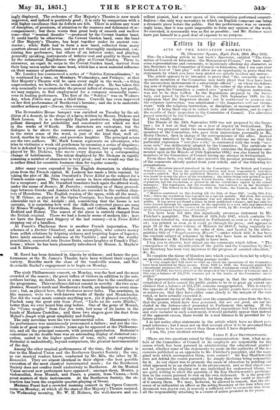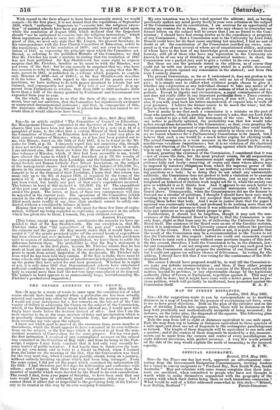Etttus to fly bitor.
ACTS OF THE EDUCATION COMMITTEE.
38, Gloucester Square, Hyde .Park, 29th May 1851. Sun—In a leading article in last week's Spectator, entitled "The Com- mittee of Council on Education : the Management Clauses," you have made some representations and comments, so injuriously afflicting my character, as late Secretary to the Committee of Council on Education, that I am sure your habitual love of "fair play" will allow me an opportunity to prove that the statements by which you have been misled are utterly baseless and untrue. The article appears to be intended to prove that " the ostensible and re- sponsible members of the Committee may fairly plead that they have been the unconscious instruments of a subordinate official" ; on whom thefollow- nig acts of duplicity are charged. " But the author of the scheme for eon- ferring upon the Committee a control over general' religious instruction, was not to be thus baffled. In the Regulations prepared by the Secre- tary, and passed by the Committee on the 24th September 183% for the expression that the Inspectors should not be authorized to examine into the religious instruction, was substituted—' the Inspectors will not INTER- FEliE ' With the religious instruction, or discipline, or management of the school ; it being their object to collect Meta and information, and to report the results of their inspection to the Committee of Council. The alteration passed unnoticed by the Committee."
This is totally untrue.
The Minute of the 24th September 1839 was not prepared by the Secre- tary ; for I was at that time on a tour of inquiry in Switzerland. The Minute was prepared under the immediate direction of three of the principal , members of the Committee, who gave their instructions personally to Mr. Harry Chester, then in charge of the correspondence of the office. Instead of passing unnoticed by the Committee, Mr. Chester informs me that the particular expression " interfere with," as contrasted with the words "exa- mine into," was deliberately adopted by the Committee. The certificate to which is appended the Regulation A, (which embodies the Regulation,com- mented upon in the Minute of 24th September 1839,) was also framed by the members of the Committee of Council during my absence in Switzerland.
From these facts, you will at once perceive the peculiar personal injustice of the comments already quoted from your article, and of the following re- presentations.
" The alteration passed unnoticed by the Committee. The British and Foreign School Society, to whom the original resolution had been transmitted, had their scruples quieted. But in the published Minutes of the Committee the regulation was made to usurp the place of the resolution ; the latter being only printed as part of a letter to the British and Foreign School Society, where it escaped notice. The regulation, not the resolution, is quoted in all the certificates signed by the school managers. The regulation, not the resolution, was referred to in the. Secretary's pamphlet, The School in its Relations with the State, the Church, and the Con- gregation.'
" Matters continued on this footing till the 10th of June 1847, [really 10th July 1847,] when the resolution was repeated by a special minute. But even this second,r expression of the Committee's intentions was not allowed to find its way to th..: public. It has never yet found a place in their published volumes, and has only be- come known through its appearance in the appendix to a very able anddiatereating pamphlet, published in the course of the present week, by Mr. Joseph Fletcher, one of the Government Inspectors of. Schools." You have been led into this injuriously erroneous statement by Mr. Fletcher's pamphlet. The Minute of 10th July 1847, which contains the resolution referred to, was presented to Parliament as soon as it was adopt- " ed ; was printed as soon as it could go through the press ; and appears in page 33 of the octavo volume of Minutes for 1846-7, being regularly in- serted in its proper place, in the order of date, and headed by the distin- guishing title of "Supplementary Minute"—under which title it has been the constant subject of reference by those who have been as familiar with these Minutes as Mr. Fletcher ought to have been.
I beg you to observe, how unjust are the comments which follow. " The consequence of this mystification of the public and the Committee by their late Secretary has been very injurious to the progress of assisted education," &c. &c.
To complete the tissue of blunders into which you have been led by relying on spurious authority, the following passage occurs.
" A very simple fact will show to what an extent the operations of the Committee have been hindered by these means. From 1833 to 1838, the Treasury granted for educational purposes 167,717/. ; from 1839 to 1850, Parliament voted 559,2171. The total of 726,9341. has been placed at the disposal of the Committee of Council; and of this sum a balance of 251,1781. remains yet in the hands of the Committee unex- pended."
The representation contained in this passage is, that the niystifications complained of hare caused the public grants to be to so great an extent un- claimed that a balance of 2.51,1781. remains unappropriated. This is exactly the opposite of the truth. The claims on the public grants have always been so numerous, that they have either come closely to the margin of the suns voted, or have actually exceeded it.
The apparent excess of the grant over the expenditure arises from the fact, that the grants, which have been promised, but arc not paid, are not in- cluded in the balance-sheet presented to Parliament this spring. If the grants promised under all the several heads of expenditure had been claimed and were included in such a statement, it would probably appear that instead of the apparent excess, there would be a real balance to be provided for by future grants. I do not notice other statements in the article which have no direct per- sonal reference ; but I must not on that account allow it to be presumed-that I admit them to be more correct than those which I have disproved.
I am, Sir, your obedient servant,
JAMES P. KAY SHUTTLSWORTH.
[There are two questions raised by this communication : first, what mem- bers of the Committee of Council or its employes are responsible for the course which has been pursued in adminhtering the educational grants ? second, whether some of the statements we made on the authority of the do- cuments published as an appendix to Mr. Fletcher's pamphlet, and the mar- ginal note which accompanies them, were correct? Sir Kay Shuttleworth does not defend the comae pursued ; he simply disclaims being responsible for it. As our object was to promote the cause of education by pointing out what appeared tows an obstacle to its advancement, and as that object can- not be promoted by singling out any individual for undeserved blame, we
are quite willing to allow the question of Sir Kay Shuttlewortli s participa- tion m the course pursued to rest on his own statement. It is the property of the Committee and their employes, let them share the credit er discredit of it among them. We may, however, be allowed to remark, that the ab- sence of so-influential an officer as the acting Secretary at the time when document was drawn out, is scarcely a sufficient alibi to exonerate Inns from • m all the responsibility attaching to a course of action persisted in for years. With regard to the facts alleged to have been incorrectly stated, we would remark—In the first place, it is not denied that the regulations of September 1839, which "authorise" Inspectors to "examine into the religious educa- tion" of assisted schools have been put prominently forward and acted upon, -while the resolution of August 1839, which declared that the Inspectors should "not be authorized to examine into the religious instruction," which these regulations profess to carry into effect, has been kept out of sight. In proof of this, we need only state that Mr. Lingen, the present Secretary, in his correspondence with the Free Church Conunittee of Education, refers to the regulation; not to the resolution of 1839 ; and not even to the rereso- lotion of 1847, as expressing the principle upon which the Committee act. Second, as referring to the published Minutes of the Committee, we find that Mr. Fletcher has made a mistake in stating that the resolution of 1847 has not been published. Sir Kay Shuttlework has some right to express surprise that Mr. Fletcher, familiar as he must be with the Minutes, was not aware of the fact ; but he can scarcely be surprised that we, who have less occasion to refer to them, should be ignorant of it, seeing that this Mi- nute, passed in 1847, is published in a volume which purports to contain only Minutes of 1846—not of 1846-7, as Sir Kay Shuttleworth describes it in his letter. Lastly, with regard to the excess of the grants over ex- penditure, we have nothing to do with money promised to schools but not claimed, and consequently not paid. Why was it not claimed? It is ap- parent from Parliamentary returns, that from 1839 to 1849 inclusive little more than a half of the money granted by Parliament and Government was expended from year to year. On the whole, it appears to us that the facts of the case, as they now stand, bear out our assertion, that the Committee has injudiciously awakened or augmented denominational jealousies ; and that, in consequence of this, the assistance offered by Government to schools has been less turned to ac- count than it would otherwise have been.]



























 Previous page
Previous page